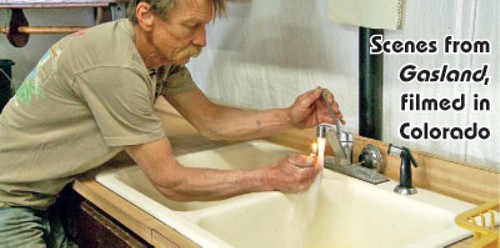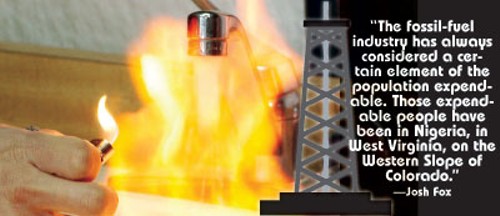Frack You
Filmmaker Josh Fox Battles the oil industry to warn about the dangers of fracking
By Matthew SchniperPage 2 of 3
MS: The oil industry made a fake trailer before your new trailer—
JF: The fake trailer is hilarious!
MS: How much do you think they’ve spent?
JF: One of my publicists did at one point estimate hundreds of millions of dollars to try to change the message. It goes from the sublime to the ridiculous, but that stuff I don’t worry about as much.
What I worry about right now is a different tactic from oil and gas, which is the reasonable voice. It reminds me a lot of those liberals who came out and said that the Iraq war was a good idea, back in [2003]. There were these people who said, “Oh, yes, well, we should go along,” and 10 years later they’re like, “Oh, we made a big mistake.”
It’s this idea of safe fracking and that we can regulate it, this idea that like Gov. Frackenlooper said, “You can drink fracking fluid,” which he had to retract. There is no such thing as nontoxic fracking fluid. It doesn’t exist. There’s no such thing as a leak-proof well. It doesn’t exist. There’s no such thing as safe fracking. It doesn’t exist.
Unfortunately, governors that lie about the issue do exist.
MS: So what do you say to people who insist that there is no credible evidence of the dangers of fracking? What’s your best, most irrefutable data, your strongest argument, your best proof on your side?
JF: This is not even a question of proof. You look out there—and I’ve been to 25 states and all over the world investigating this issue—the contamination is clear from all the reporting. The New York Times, Pulitzer Prize-winning ProPublica, there are thousands of pages written on the contamination. Anyone who’s saying it doesn’t exist is living on a slightly different planet.
But the best evidence of why these things are happening comes from the gas industry itself. Their own reports, which are featured in Gasland II. We know it is happening, and the first film is evidence of that. All the reporting is evidence of that. All those people are evidence of that ...
And a lot of this has to do with PR. Who can win the PR war ... and all I’m trying to say is, “Look at this reporting. Look at what’s actually being wrought on these people.” And it’s not a small number of people. Finding contamination cases making the first Gasland was not difficult at all.
MS: The EPA released its first progress report in December 2012 on its two-year study of potential impacts of hydraulic fracturing on drinking water, with a final draft promised by 2014. What do you think of that report so far?
JF: I haven’t seen the progress report. The EPA would be in conflict with their own findings on several occasions if they were to come out and give fracking a clean bill of health.
One of the first interviews I did was with Weston Wilson; we know him as Weston Wilson the Whistleblower, in Region 8 offices at EPA. He blew the whistle on a 2004 report by EPA which said, “Yes, we’re injecting toxic material into the ground but it is no risk.” [Laughs.]
He said it was an Orwellian world. Unfortunately, what we’ve seen, and you’ll see demonstrated in Gasland II, is that the EPA is subject to the same political pressures as any of our state agencies are. And that the industry has an incredible grip on our regulatory agencies.
In Pennsylvania, [in] the public accountability initiative report ... called “Fracking and the Revolving Door in Pennsylvania,” they examine all the people who are supposed to be regulating on behalf of the citizens, and they said it’s had a corrupting effect and that the industry has captured the regulatory agencies that are supposed to represent the citizens. It does not mince words. And we’re seeing the same situation over and over again.
Dave Neslin, of the Colorado Oil & Gas Conservation Commission [COGCC] ... first said we could have an interview and then chickened out when he saw our release form and walked out in the middle of Gasland I. His own agency has confirmed time after time after time in their 2010 groundwater report instances of groundwater contamination due to drilling and fracking all throughout Colorado. If you look at the 2010 groundwater report from the COGCC, it is very clear about all the contamination that’s occurring from abandoned wells, cement problems and other issues.
This man left the COGCC to work for a firm that represents Encana. Encana is a subject of EPA’s Region 8 investigation in Wyoming. It’s unconscionable. You can’t switch sides from representing the people to representing the industry, unless you’re motivated by one thing.
MS: The Obama administration is supposed to issue new fracking regulations any day now. [It did May 16, to criticism from both sides.] What do you expect from it?
JF: The Obama administration has clearly embraced natural gas ... there were natural-gas talking points in the State of the Union address. I don’t think they did that with good science, with an eye toward the brilliant reporting that’s happened. I don’t think they did that with the idea of good government in mind. And one of the things that we’d like to do is reach out to President Obama and say, “Your base is not with you on your position on natural gas, you need to do what we elected you to do.”
I was campaigning door to door in the Pennsylvania primary in Wayne County, Pa., knocking on doors for President Obama in April 2008. And many of my colleagues obviously preferred him to the opposition in the last election. But he needs to go ahead and represent the people who elected him.
They’ve gotta start paying attention. This issue is not going away. When we talk about Frack Colorado, Frack Pennsylvania, Frack California, Frack New York, what we’re talking about is tying ourselves into another 30 to 50 years of dependency on the same old oil companies that are doing the fracking. This is Royal Dutch Shell, this is Exxon. These are the guys who have been playing with our purse strings.
Once they start exporting natural gas, we’re going to be subject to the same international pricing pressures we are with oil. And those multinationals who are not Americans, they’re multinationals with investors from China and all over the world, those are the guys who are now going to be controlling how much you have to pay for your energy.
MS: I see Smokey the Bear has been co-opted by someone in an anti-fracking ad that reads, “Only you can prevent faucet fires”—
JF: Yeah, I love that. I bought one of those shirts.
MS: Have you heard any blowback from that? Is the Forest Service upset about it?
JF: You can’t frack the forest. I mean, come on. If we can’t prevent faucet fires—if they start fracking in the forest, you’re gonna have forest fires. I mean, I think it’s [laughs]—it’s one of my favorite things.
It was in Albany. I saw the artist who’d created that and she only had red and green T-shirts, and I said, “You made an activist T-shirt and you didn’t make a black one?”
And she said, “I’ll make you a black one.” And I said, “I’ll buy three.”
Smokey should come out against [fracking] for real. Smokey as a fracktivist makes a lot of sense.
MS: I was reading one review of the film—
JF: I don’t read reviews.
MS: Well, this person said, “Although the film is about fracking, its deeper subject is America in the early 21st century. What used to happen in the faraway Third World or indigenous regions, is now going on in the U.S. Call it karma ... seducing the populace with promises of ‘energy independence,’ a government that once vaunted democracy as its prime export now disenfranchises citizens.” Unless you don’t care to give away too much of the film content, can you elaborate?
JF: OK, the fossil-fuel industry has always considered a certain element of the population expendable. Those expendable people have been in Nigeria, in West Virginia, on the Western Slope of Colorado. Those are the people who are allowed by them and by a lot of governments to be poisoned and destroyed.
When you look at the map of ... shale plates all over America, the area of people being considered expendable by the fossil-fuel industry has expanded to a lot of new places. You’re seeing those people who are not used to being treated that way. You could call it exploitation models deployed in the developing world, you could call it an exploitation model deployed in West Virginia, but that’s their M.O. That’s the way they treat people. Like, “How did our gas get under their mountains?”
And let’s move them aside, and what you’re seeing is an equal and opposite reaction, like a Newtonian political equation. ...
And it’s a stand-and-be-counted moment. For the president, for all the other elected officials that are involved in this debate, I urge them, please, we are here to work with you, we want you to work with the people. And not with the fossil-fuel industries who had their way with so many at such great expense. These are human-rights issues. These are issues of democracy, and that’s what the new film speaks to. CW
Matthew Schniper is an arts editor at the Colorado Springs Independent and an award-winning restaurant critic and food writer. He also frequently writes about film and sustainability topics. He’s traveled through more than 30 countries and moonlights as a photographer and urban gardener.
Latest in Cover Story
Readers also liked…
-
Forget the family pedigree—Robert F. Kennedy Jr should not be the next president of the United States
Trojan Horse
- Jun 21, 2023
-
Women decry harassment and toxic culture at St. George auto dealership
Men at Work
- Oct 11, 2023






